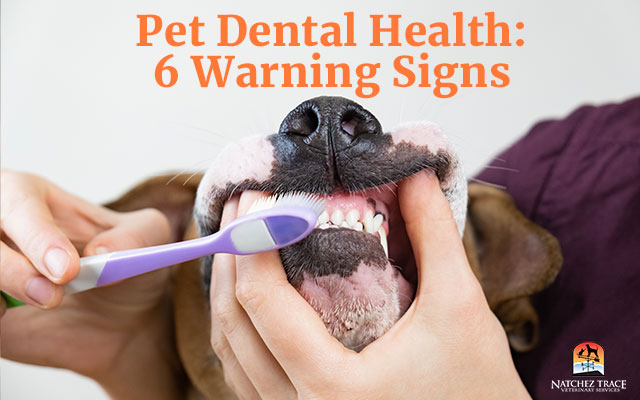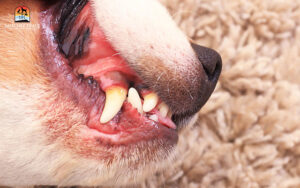 Did you know poor pet dental health can lead to more than bad breath? Left unchecked, your pet’s dental problems can escalate into serious health issues, such as gum disease, tooth loss, and even systemic conditions affecting the heart, liver, and kidneys.
Did you know poor pet dental health can lead to more than bad breath? Left unchecked, your pet’s dental problems can escalate into serious health issues, such as gum disease, tooth loss, and even systemic conditions affecting the heart, liver, and kidneys.
Regular dental care keeps your pet’s mouth clean and helps prevent these hidden dangers.
Let’s explore practical ways to maintain your pet’s dental health and well-being.
Understanding Common Pet Dental Problems
Maintaining your pet’s dental health is crucial for their overall well-being. Dental issues are common, especially as pets age, and can lead to discomfort, infections, and even more severe health problems.
Understanding your pet’s typical dental challenges can help you take proactive steps to keep its teeth and gums healthy.
Let’s dive into the most common pet dental problems and how to manage them.
What Are Common Pet Dental Issues?
From tartar buildup to gum disease, dogs and cats face various dental problems that can affect their quality of life. Without regular care, these issues can escalate, causing pain and even systemic health concerns.
Here are some common dental problems to watch for:
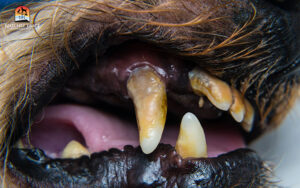 Tartar Buildup
Tartar Buildup
- Plaque hardens into tartar, which sticks to the teeth and irritates the gums.
- This can lead to more severe issues like gingivitis or periodontal disease.
- Gum Disease (Periodontal Disease)
- Caused by tartar and plaque under the gumline.
- Symptoms include bad breath, red or bleeding gums, and loose teeth.
- Can result in tooth loss and even impact organs like the heart.
- Epulis (Gum Growths)
- A benign growth on the gums which is often due to chronic inflammation.
- These can cause discomfort and may bleed when touched or brushed.
- Tooth Fractures or Wear
- Pets chewing hard objects or rough-textured foods may break or wear down their teeth.
- This can expose the sensitive pulp and lead to infections.
- Tooth Root Abscesses
- Infections at the root of the tooth, often resulting in swelling or pain.
- Requires veterinary intervention to treat.
Early detection and regular dental check-ups are essential to prevent these problems from worsening.
Watch this video of common dental problems in older dogs:
Signs of Dental Issues in Pets
How can you tell if your pet’s teeth need attention? Recognizing the signs of dental problems early can save your pet from discomfort and more serious health issues. Here are some common symptoms to watch for:
- Bad Breath (Halitosis)
- Persistent bad breath is often the first sign of dental trouble.
- It’s caused by bacteria buildup from plaque and tartar.
- Bleeding or Swollen Gums
- Red, inflamed, or bleeding gums can indicate gingivitis or periodontal disease.
- Gums may bleed during chewing or brushing.
- Difficulty Chewing or Eating
- Pets with dental pain may avoid hard foods or chew on one side of their mouth.
- They might drop food or whine while eating.
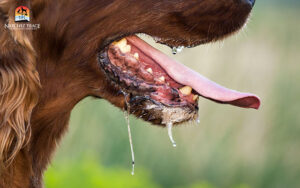 Excessive Drooling
Excessive Drooling
- Increased saliva can signal mouth pain or irritation.
- You might also notice blood-tinged drool.
- Loose or Missing Teeth
- Advanced dental disease can cause teeth to loosen or fall out.
- This is more common in smaller breeds.
- Visible Tartar or Discolored Teeth
- A yellow or brown coating on the teeth is a sign of tartar buildup.
- Over time, this can lead to tooth decay.
What to Do?:
If you notice these signs, schedule a dental checkup with your vet. Early intervention can prevent more serious complications like infections or organ damage.
Consequences of Ignoring Dental Health: What Happens If You Skip Dental Care?
Ignoring your pet’s dental health might seem minor initially, but it can have serious consequences that affect your pet’s overall well-being. Here’s why maintaining your pet’s oral hygiene is so crucial:
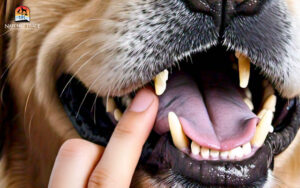 Tooth Loss and Pain
Tooth Loss and Pain
- One of the most obvious consequences of poor dental care is tooth loss. Plague and tartar can lead to gum disease, infections, and tooth loss.
- This can be painful for your pet, making it difficult for them to chew or eat properly. It may also cause discomfort, resulting in behavioral changes like irritability or a reluctance to eat.
- Gum Disease (Periodontal Disease)
- Gum disease is a direct result of plaque and tartar buildup. If not cleaned regularly, plaque hardens into tartar, which can irritate the gums, leading to gingivitis (inflammation of the gums) and, eventually, periodontal disease.
- This condition can cause severe pain, swelling, and bleeding gums, and in advanced stages, it may even affect the jawbone, causing further complications.
- Infections and Abscesses
- Untreated gum disease can cause oral infections, which may spread to other areas of your pet’s body. Abscesses (pockets of pus) can form around the teeth and gums, leading to swelling and further infection.
- These infections can become severe and affect other organs if left untreated, leading to systemic health problems.
- Heart Disease
- One of the most alarming consequences of poor dental health is the risk of developing heart disease. Bacteria from gum infections can enter the bloodstream and travel to the heart, causing infections in the heart valves or leading to heart murmurs.
- In severe cases, this can result in life-threatening heart conditions, especially in dogs and cats with preexisting heart issues.
- Liver and Kidney Problems
- Like the heart, the bacteria from untreated oral infections can spread to vital organs like the liver and kidneys.
- Chronic infection or inflammation caused by dental disease can damage organs, especially in smaller pets. Due to their higher risk for dental issues, these pets are more susceptible to these complications.
- Bad Breath and Mouth Odor (Halitosis)
- Chronic bad breath is often one of the first signs of dental issues. When bacteria accumulate in your pet’s mouth due to plaque buildup, it produces a foul odor.
- This can indicate serious dental problems, such as gum disease or abscesses, which should be addressed promptly to avoid further complications.
- Systemic Health Complications
- Untreated dental disease can cause bacteria and toxins to accumulate in your pet’s mouth, affecting its overall health and leading to problems beyond the mouth.
- Poor oral health has been linked to diabetes, respiratory issues, and even cancer in extreme cases, showing that dental care is a key part of your pet’s general health.
Here’s more info about the consequences of neglecting your pet’s dental health:
Hidden Dangers for Cats and Smaller Dogs
 Due to their more compact mouths and teeth, cats and smaller dogs are particularly prone to dental issues. Small dogs are more likely to experience tooth decay, tartar buildup, and gum disease. If left unchecked, the consequences can be even more severe, affecting their heart, liver, and overall health. Regular dental care is critical for small breeds to prevent these hidden dangers from damaging their health.
Due to their more compact mouths and teeth, cats and smaller dogs are particularly prone to dental issues. Small dogs are more likely to experience tooth decay, tartar buildup, and gum disease. If left unchecked, the consequences can be even more severe, affecting their heart, liver, and overall health. Regular dental care is critical for small breeds to prevent these hidden dangers from damaging their health.
Cats are prone to dental issues, with some conditions being common as they age. Periodontal disease, caused by plaque and tartar buildup, is a frequent problem that can lead to gum inflammation and tooth loss if untreated. Cats are also susceptible to tooth resorption, affecting up to 60-70% of cats over five, where the tooth structure breaks down. Another concern is stomatitis, a painful mouth, and gum inflammation often linked to an overactive immune response. Factors such as a lack of abrasive textures in their diet to naturally clean teeth and challenges with regular dental care, like brushing, contribute to these issues.
In summary, neglecting your pet’s dental health isn’t just about bad breath or missing teeth—it can lead to serious systemic health problems, including heart and liver disease. Regular dental care, including brushing, vet check-ups, and professional cleanings, can help prevent these risks and keep your cat or dog healthy for years.
Stay alert and watch this video to be more mindful of your pet’s dental health:
Pet Dental Health: Prevention and Care
Dental health is crucial for your pet’s overall well-being. Regular care can help prevent painful dental problems and extend your cat or dog’s life.
Taking simple steps at home and scheduling routine vet dental visits can help prevent the development of issues like tartar buildup or gum disease.
Let’s explore how to keep your pet’s teeth healthy and strong.
How to Prevent Pet Dental Issues
Prevention is easier than treatment. Taking proactive steps can save your pet from painful dental problems and costly procedures. Here’s how to maintain your pet’s dental health:
- Brush Your Pet’s Teeth Regularly
- Use a pet-safe toothbrush and toothpaste.
- Aim for daily brushing, but a few times a week can make a difference.
 Schedule Routine Vet Check-Ups
Schedule Routine Vet Check-Ups
- Regular dental exams help catch issues early.
- Your vet may recommend professional cleanings based on your pet’s needs.
- Provide Dental Treats and Chews
- Look for products designed to reduce plaque and tartar.
- These treats can be both tasty and beneficial for oral health.
- Offer Dental-Friendly Toys
- Chewing on safe toys helps scrape away plaque.
- Avoid hard toys that could damage teeth.
- Feed a Healthy Diet
- Some pet foods are specially formulated for dental health.
- Wet or moistened food may help if your pet has existing dental issues.
Incorporating these habits into your routine can significantly reduce the risk of dental problems and keep your pet’s smile healthy.
Best Pet Food for Dental Issues
Food matters when it comes to dental health. The proper diet can significantly prevent dental issues like tartar buildup, gum disease, and bad breath. Let’s explore how choosing the right food, including specialized kibble or wet food, can help maintain your pet’s oral health.
- Specialized Dental Diets
- Many brands offer dental-specific pet food designed to reduce plaque and tartar buildup.
- These formulas often include larger kibble that helps scrub your pet’s teeth as they chew, reducing the need for additional teeth cleaning.
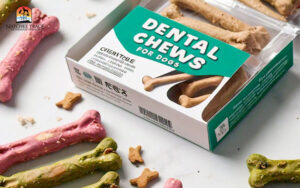 Dental Treats and Chews
Dental Treats and Chews
- Dental chews are tasty and can help clean teeth by scraping away food particles and plaque.
- Look for treats approved by the Veterinary Oral Health Council (VOHC) to ensure they are effective.
- Wet Food vs. Dry Kibble
- Wet food may be easier on your pet’s teeth if it already has dental issues, but it can also contribute to plaque buildup if not paired with other dental care methods.
- On the other hand, dry kibble can help reduce tartar over time, but choosing the right kind is important to prevent it from sticking to your pet’s teeth.
- Also, in the long run, Dr. Smith feels wet food is healthier for dogs and cats overall. It helps promote healthier kidneys and urinary tracts.
- Nutrient-Rich Diets
- A balanced diet with vitamins and minerals, such as calcium and phosphorus, supports healthy teeth and gums.
- Avoid overly processed foods that can contribute to plaque and tartar buildup.
- To be very proactive, feed your pet a TCVM energetically appropriate diet.
By feeding your pet the right food, you can support its dental health and prevent future dental problems, ensuring it enjoys a healthy smile for years to come.
Veterinary Intervention: When to Consider Professional Dental Cleaning
Is it time for a vet visit? While regular at-home care is essential, professional dental cleaning by a veterinarian is sometimes necessary to address issues that can’t be solved with brushing or dental treats alone. Here’s when to consider professional dental cleaning and how it can benefit your pet.
- Signs of Advanced Dental Disease
- If your pet’s teeth show signs of significant tartar buildup or if you notice swollen, bleeding gums, it might be time for a professional cleaning.
- Persistent bad breath or difficulty eating strongly indicates that your pet needs professional dental care. These symptoms suggest more severe underlying issues, such as gum disease or infected teeth.
- Pain or Discomfort
- A vet visit is necessary if your pet is reluctant to chew, experiences pain when eating, or shows signs of mouth sensitivity.
- In these cases, professional cleaning removes harmful plaque and tartar and addresses pain-causing conditions, such as tooth infections or abscesses.
-
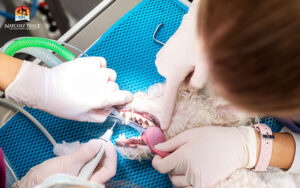 Routine Care for Preventative Health
Routine Care for Preventative Health
- Even if your pet doesn’t show obvious signs of dental problems, annual vet check-ups should include dental assessments.
- Regular dental cleaning helps prevent dental issues from becoming more serious and supports long-term oral health.
- Sedation and Professional Techniques
- Professional dental cleaning requires anesthesia to ensure your pet stays still while the vet cleans their teeth thoroughly.
- Vets also have access to advanced tools, such as ultrasonic scalers and probes, that can clean beneath the gum line, which isn’t possible with at-home care.
- Comprehensive Health Check
- During a professional cleaning, the vet will also check for signs of more serious conditions, such as oral tumors or periodontal disease, that could affect your pet’s overall health.
- Treating dental problems early can help avoid complications like heart disease or kidney issues arising from untreated infections.
Having your pet’s teeth professionally cleaned when necessary can ensure their mouth stays healthy and free from painful conditions, improving their overall well-being.
Healthy Teeth, Happy Pets
Is your pet’s mouth in need of professional dental care? While routine brushing and dental treats can go a long way in maintaining your pet’s oral health, there are times when professional intervention is necessary. Here’s when you should consider having your pet undergo a professional dental cleaning:
- Visible Tartar and Plaque Buildup
- If you notice thick layers of tartar or plaque on your pet’s teeth, it’s a sign that professional cleaning is needed. Tartar can’t be removed with regular brushing; once it builds up, it can lead to serious issues like gum disease and tooth loss.
- A vet cleaning will remove both visible and hidden tartar that’s built up below the gumline.
- Gum Inflammation and Bleeding
- Swollen or bleeding gums are red flags that your pet may have periodontal disease. If you notice your pet’s gums are red, inflamed, or bleed when you try to brush their teeth, it’s time for a professional cleaning.
- Untreated gum disease can lead to infection and tooth loss and even affect organs like the heart and kidneys.
- Bad Breath (Halitosis)
- While bad breath is common in pets, persistent or foul-smelling breath often indicates underlying dental problems. If your pet’s breath smells rotten, it could be a sign of infection, decaying teeth, or gum disease.
- A professional dental cleaning can eliminate the bacteria causing the odor and improve your pet’s breath.
 Difficulty Eating or Chewing
Difficulty Eating or Chewing
- If your pet shows signs of pain while eating, such as avoiding hard foods, chewing on one side, or dropping food, there may be an underlying dental issue.
- Professional cleaning can help identify and treat problems like abscesses, cracked teeth, or gum infections causing discomfort.
- Changes in Behavior
- Sometimes, dental issues can cause behavioral changes, such as irritability or reluctance to play with chew toys. Pain from dental problems can affect your pet’s overall mood and energy levels.
- A professional cleaning can address pain and prevent further complications leading to more serious health issues.
- Annual Check-Ups for Preventative Care
- Even if your pet seems to have healthy teeth, routine professional cleanings can prevent dental issues before they become serious.
- Some vets recommend having your pet’s teeth professionally cleaned during its annual wellness exam. This is particularly important for pets prone to dental disease, such as small breeds or those with certain medical conditions.
- Signs of Oral Infections or Abscesses
- If you notice swelling in your pet’s face or around its gums, or if it seems to be in pain when you touch its face or mouth, this could indicate an infection or abscess.
- Professional cleaning allows vets to detect and treat these infections early, preventing them from spreading or causing systemic issues.
By scheduling professional dental cleanings at the right time, you can help prevent your pet from experiencing pain or more severe health problems caused by dental disease. Regular professional care is essential to your pet’s overall health and well-being.
If you have more questions about pet dental problems, contact our vet now!
FAQs:
- What are the common dental problems in dogs?
Common issues include tartar buildup, gum disease, and epulis (gum growth). Left untreated, these can lead to tooth loss and more severe health problems. - What’s the best dog food for dental issues?
For dogs with dental issues, specially formulated dental-specific kibble and wet food can help reduce tartar buildup and support oral health. These products are designed to clean teeth and promote healthier gums. However, Dr. Smith feels wet food is a healthier long-term option for both dogs and cats, as it supports kidney health and maintains a healthier urinary tract. He recommends combining a wet diet with regular dental checkups and professional cleanings to ensure optimal oral health for your pet. - What are the symptoms of pet dental problems?
Watch for bad breath, bleeding gums, drooling, difficulty chewing, and loose teeth. These can signal underlying dental problems that need attention.

